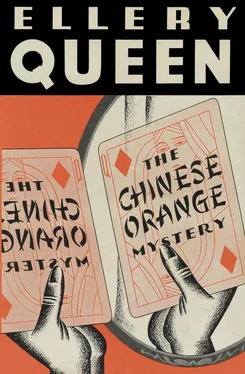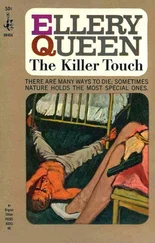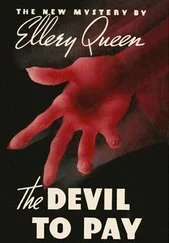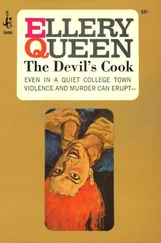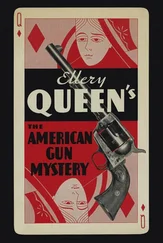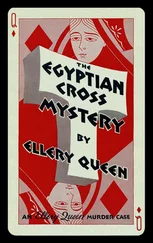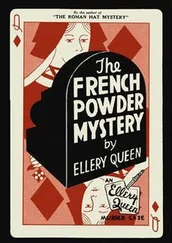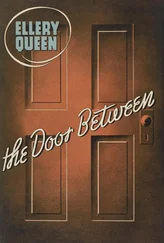“Make yourself comfortable,” said Osborne to the stout little man. “There are cigarettes and cigars in that humidor on the table; candy, magazines, fruit. I’ll let you know the moment Mr. Kirk comes in.”
“Thank you,” murmured the stranger. “Very kind of you, I’m sure. This is pleasant,” and he sat down, still bundled up to the neck, in a chair near the table. “Quite like a club,” he said, nodding in a pleased way. “ Very nice. And all those books, too.” Three walls of the room were covered with open bookshelves, interrupted only by the doors on opposite walls and an artificial fireplace on the third, above which hung two crossed African spears behind a battered Impi war-shield. The fourth wall, broken up by two windows, held the reading table. Deep chairs stood before the bookcases like sentinels.
“Yes, isn’t it,” said Osborne in a dry voice, and he went back to the office, shutting the door behind him just as the stout little man sighed comfortably and reached for a magazine.
Osborne picked up the telephone on his employer’s desk and called the Kirk suite. “Hello! Hubbell.” He spoke irritably. “Mr. Kirk in?”
Hubbell’s whining English voice said: “No, sir.”
“When do you expect him back? There’s some one waiting for him here.”
“Well, sir, Mr. Kirk just ’phoned saying that he’d be late for the dinner-party and to have his clothes laid out.” Hubbell’s voice grew shrill. “That’s Mr. Kirk all over! Always doing the unexpected, if I may say so, sir. Now here he tells me he’ll be in at a quarter to seven and to set a place for ‘an unexpected guest,’ a Mr. King or Queen or somebody, and—”
“Well, set it, for heaven’s sake,” said Osborne, and hung up. He sat down, his eyes far away.
At twenty-five minutes past six the office-door opened and Glenn Macgowan hurried in. He was in dinner clothes, and he carried a hat and topcoat. He was smoking a slender cigar rather furiously and his crystal eyes were troubled.
“Still stamps, eh?” he said in his deep voice, flinging his towering length into a chair. “Old Faithful Ozzie. Where’s Don?”
Osborne, intent on his album, looked up with a start. “Oh, Mr. Macgowan! Why, I don’t know, sir. He hasn’t shown up here.”
“Damn.” The big man chewed an immaculate fingernail. “He’s as unpredictable as next year’s Derby winner. I once bet him a thousand dollars he couldn’t get to an appointment on time and, by George, I won! Seen Marcella?”
“No, sir. She rarely comes in here, you see, and I—”
“Look here, Ozzie.” Macgowan smoked nervously. There was a bigness about him that overflowed the chair. Above his broad shoulders he had a lean face and a high pale forehead. “I’ve got to see Don right away. Are you sure—?”
Osborne was astonished. “But won’t you see him this evening at dinner, sir?”
“Yes, yes, but I’ve got to see him before dinner. Sure you don’t know where he is?” said Macgowan impatiently.
“I’m sorry, sir. He left early and didn’t say where he was going.”
Macgowan frowned. “Let’s have a paper and pencil.” He scribbled hastily on the sheet Osborne hurried to provide, folded the paper, thrust it into an envelope, which he sealed, and tossed the envelope on Kirk’s desk. “You’ll see that he gets it before dinner tonight, Ozzie. It’s important — and personal.”
“Surely.” Osborne tucked the envelope into one of his pockets. “By the way, sir, there’s something I’d like to show you, if you have a moment.”
Macgowan paused at the door. “I’m in a hurry, old chap.”
“I’m sure you’ll want to see this, Mr. Macgowan.” Osborne went to a wall-safe and pulled out a large leather-bound, ledger-like volume. He carried it to his desk and opened it; it was full of mounted postage stamps.
“What’s this, something new?” asked Macgowan, with sudden interest.
“Well, here’s one item that’s new, sir.” Osborne pointed out a stamp and handed Macgowan a small magnifying glass from a litter of philatelic tools on the desk.
“Nanking issue of the dragon, eh?” muttered Macgowan, putting the glass to the green-and-rose stamp. “Something wrong with the surcharge, isn’t there? By Jove, the bottom character’s omitted!”
“That’s right, sir,” said Osborne with a vigorous nod. “That vertical surcharge ought to read Chung Hua Ming Kuo — if that’s the way they pronounce it — ‘Middle Flowery People’s Kingdom.’ But on this stamp the last character was somehow dropped out, and the ‘Kingdom’ part’s not there. Trouble with Chinese rarities, especially the surcharges, is that you’ve got to have a good working knowledge of the ideographs to be able to spot an error. This one’s comparatively easy; I don’t know Chinese from Greek. But old Dr. Kirk read this for me. Interesting, eh, sir?”
“Damnably. Where did Don pick this up?”
“Auction. About three weeks ago. Delivery was held up for some reason until yesterday. I think they were checking up its authenticity.”
“He has all the luck, darn him,” grumbled Macgowan, setting down the glass. “I haven’t run across a really interesting local rarity in weeks.” He shrugged and then said in an oddly quiet voice: “Did this Nanking set Don back much, Ozzie?”
Something tightened Osborne’s lips, and his eyes grew cold. “I really couldn’t say, sir.”
Macgowan stared at him, and then suddenly slapped his thin back. “All right, all right, you loyal old coot. Don’t forget that note. You tell Don I dropped in early purposely. I’ll be back in time for dinner. Want to go downstairs and make a few calls.”
“Yes, Mr. Macgowan,” said Osborne with a smile, and returned to his desk.
It was extraordinary how events ranged themselves that evening. Everything seemed to fit, like a woman’s new gloves. There was a smoothness, an inevitability, about things. And they all swirled about the head of poor Osborne, a colorless midge working at his job.
And all the time the door to the anteroom was closed, and nothing but silence came from there.
It was exactly 6:35, for example, when the office-door opened again and brought Osborne’s head up sharply. A tall magnificent woman was consciously framed in the doorway, a smile on her red lips. Osborne climbed to his feet, more than half-annoyed.
“Oh,” said the woman, and the smile vanished. It was as if she had put it on for the ceremony of making an entrance. “Mr. Kirk isn’t here?”
“No, Miss Llewes.”
“Isn’t that disgusting!” She leaned against the open door thoughtfully, her green eyes studying the room. She was dressed in something tight and shimmering. Her bare arms protruded from beneath a short ermine wrap. There was a deep cleft between her breasts which tightened and loosened with her slow breathing. “I did want to talk to him.”
“I’m sorry, Miss Llewes,” said Osborne. To him there was something infinitely more substantial, if less delectable, in Miss Diversey. This woman was as unreal as a Garbo seen upon the silver screen. One might look, but not touch.
“Well... Thank you.” She had an unreal voice, too; low and faintly hoarse, with an undercurrent of warmth. Osborne blinked and stared, fascinated, into her green eyes. She gave him a slow smile and vanished.
The two women met outside the office-door under the vigilant gaze of Mrs. Shane, who knew, saw, and heard all. Irene Llewes’s ermine brushed the arm of the tiny woman in the black evening gown who had just come from the Kirk suite. The two women halted, frozen still by the same instantaneous surge of dislike. Mrs. Shane looked on with gleaming eyes.
They stared at each other for perhaps fifteen seconds unmoving; the tall woman, slightly inclined; the small woman, eyes raised steadily. Neither said a word. Then Miss Llewes passed on toward the transverse corridor, a glitter of the most mocking triumph in her green eyes. She walked as if it were a sensual pleasure — slowly, with a faint trace of hip-sway.
Читать дальше
